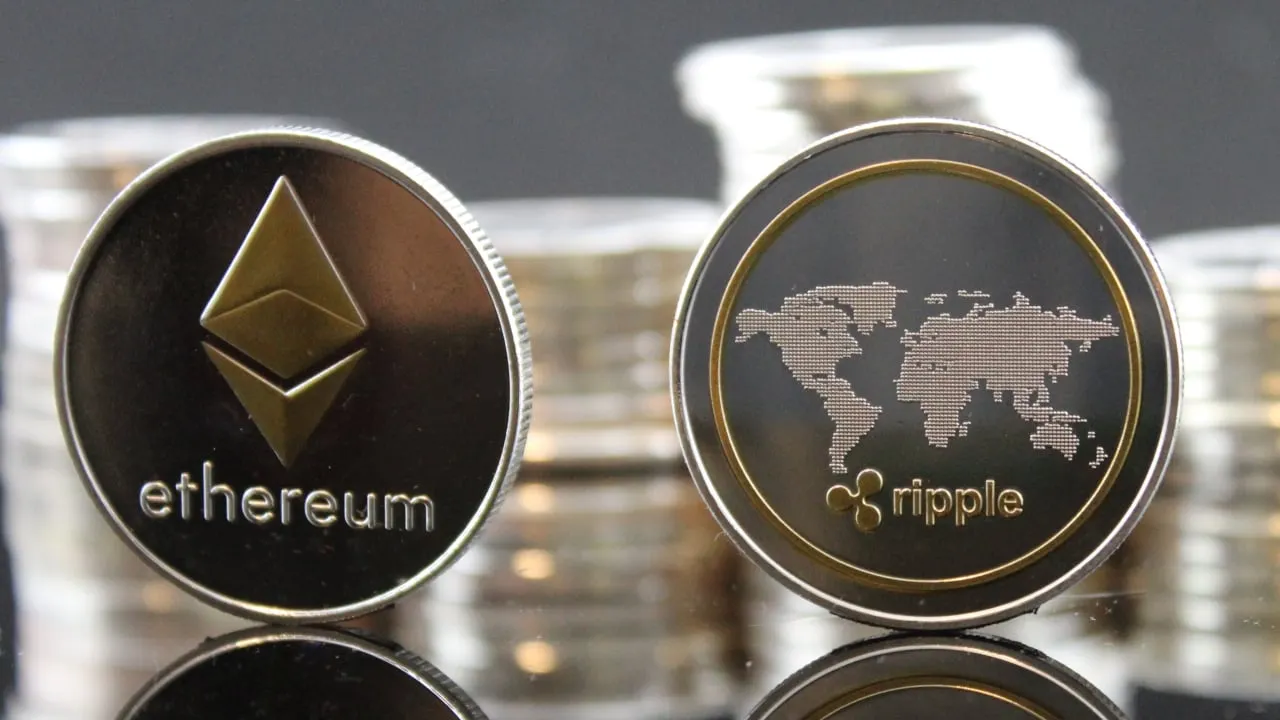Testing, testing…RLUSD! We’re excited to share that Ripple USD (RLUSD) is now in private beta on XRP Ledger and Ethereum mainnet. RLUSD has not yet received regulatory approval and therefore is not available for purchase or trading – please be cautious of scammers who claim they…
— Ripple (@Ripple) August 9, 2024
Coin Prices
BTC
$97,527.00
4.22%ETH
$3,145.29
0.42%SOL
$243.07
2.11%BNB
$612.69
-0.41%XRP
$1.12
1.75%DOGE
$0.386115
-1.71%USDC
$1.001
-0.03%STETH
$3,140.41
0.28%ADA
$0.784089
-3.90%TRX
$0.199181
0.19%SHIB
$0.00002413
-1.99%WBTC
$97,196.00
4.35%TON
$5.50
0.76%AVAX
$34.24
-2.23%WSTETH
$3,720.64
0.83%BCH
$523.18
17.89%SUI
$3.57
-5.62%LINK
$14.67
-0.19%WETH
$3,137.24
0.38%DOT
$5.70
-4.82%PEPE
$0.00001941
-4.61%LEO
$8.51
0.84%XLM
$0.241298
3.38%LTC
$90.52
4.80%NEAR
$5.52
-3.68%APT
$11.69
-7.37%WEETH
$3,316.39
1.01%UNI
$8.87
-3.19%USDS
$0.995309
-0.71%CRO
$0.176115
-1.97%HBAR
$0.124472
0.96%ICP
$9.07
-1.63%ETC
$26.79
3.23%BONK
$0.00005243
-5.67%KAS
$0.153582
-4.39%RENDER
$7.43
-9.17%USDE
$1.003
-0.05%TAO
$480.32
0.75%POL
$0.439454
1.16%WBT
$24.18
0.83%OM
$3.62
-9.50%FET
$1.23
-5.68%WIF
$3.17
-5.07%XMR
$160.98
1.15%STX
$1.94
4.78%ARB
$0.705549
1.86%FIL
$4.51
2.07%OKB
$44.19
0.06%VET
$0.03208649
-0.97%MNT
$0.748075
1.50%FLOKI
$0.00025947
6.26%ATOM
$6.20
-3.94%AAVE
$159.20
-3.26%FDUSD
$1.001
-0.03%INJ
$23.59
-3.51%IMX
$1.29
-3.22%OP
$1.71
-3.33%TIA
$5.05
-1.29%GRT
$0.215781
-6.31%SEI
$0.469725
-2.62%BGB
$1.39
2.76%FTM
$0.684423
-1.58%WETH
$3,140.00
0.32%RUNE
$5.31
1.41%ALGO
$0.209005
-5.28%RAY
$5.75
4.70%RETH
$3,520.83
0.46%THETA
$1.61
-5.78%CBBTC
$97,458.00
4.33%BRETT
$0.157675
-11.47%SOLVBTC
$97,249.00
4.28%BSV
$76.68
11.07%POPCAT
$1.55
-9.96%METH
$3,298.96
0.58%ENA
$0.528613
-1.17%PYTH
$0.401872
-3.43%JUP
$1.077
-3.98%WLD
$2.12
-6.57%ONDO
$0.994761
-2.31%EZETH
$3,223.26
0.40%PNUT
$1.36
-16.00%MKR
$1,532.45
1.36%KCS
$11.00
-0.01%MSOL
$299.90
2.24%QNT
$87.51
-0.95%GT
$9.79
0.11%AR
$17.49
-3.58%BTT
$0.00000118
8.12%GALA
$0.02809819
-4.44%BEAM
$0.02136539
-6.88%LBTC
$97,380.00
4.65%FLOW
$0.692108
0.99%FLR
$0.02000443
0.86%FTN
$3.14
1.11%XTZ
$1.029
0.77%MATIC
$0.43903
1.10%GOAT
$1.017
-9.78%LDO
$1.13
-4.28%EOS
$0.652895
1.38%SOLVBTC.BBN
$97,276.00
4.30%JUPSOL
$256.14
1.96%STRK
$0.46689
-2.28%EETH
$3,133.26
1.48%JASMY
$0.0200187
-6.10%HNT
$5.63
-2.72%XEC
$0.0000487
9.51%MOG
$0.00000245
3.51%WBTC
$97,195.00
4.15%AKT
$3.73
-4.75%TKX
$11.52
-1.21%MEW
$0.01008133
-6.70%NEO
$12.69
1.99%AIOZ
$0.783931
-4.11%AERO
$1.26
-2.33%AXS
$5.67
0.23%DYDX
$1.23
-0.75%CORE
$0.929499
-3.02%KAIA
$0.14548
-0.88%EGLD
$30.54
0.26%APE
$1.15
4.50%NEXO
$1.27
1.67%PENDLE
$4.97
-1.33%SAND
$0.33992
-0.63%DOGE
$0.384909
-1.92%MINA
$0.64681
-2.04%USDD
$0.999156
-0.23%BNSOL
$246.57
2.19%ORDI
$35.95
-4.24%NEIRO
$0.0017919
-13.12%DOG
$0.00732483
-6.49%MANA
$0.396475
-2.43%NOT
$0.00702237
-5.03%RSETH
$3,245.38
0.79%WETH
$3,134.85
0.23%CFX
$0.145009
-2.88%CHZ
$0.072838
-1.98%XAUT
$2,677.66
1.46%GNO
$254.68
-1.60%ZEC
$43.34
3.32%WETH
$3,137.74
0.07%FRAX
$0.999651
0.23%BOME
$0.00940284
-6.14%BTG
$37.02
15.73%ARKM
$2.03
-0.57%XDC
$0.04200201
1.24%W
$0.224288
-4.81%ENS
$18.16
0.55%IOTA
$0.170406
-0.92%AXL
$0.700099
-3.27%LUNC
$0.00010623
-1.01%CKB
$0.01278206
-1.61%SUPER
$1.26
-0.71%CBETH
$3,400.76
0.31%ETHDYDX
$1.23
-0.58%VIRTUAL
$0.556516
3.10%SNX
$1.68
-4.09%BDX
$0.081441
-0.63%PYUSD
$1.001
-0.02%TURBO
$0.00779335
-5.92%CAKE
$1.89
-0.79%EBTC
$96,941.00
4.93%ROSE
$0.078758
-1.69%PAXG
$2,682.86
1.48%SAFE
$1.051
-3.81%GRASS
$2.16
-13.03%SUPEROETHB
$3,139.80
0.51%BTC.B
$97,370.00
4.17%CORGIAI
$0.00150914
-2.44%ZK
$0.137336
-4.17%RON
$1.40
0.00%FWOG
$0.518285
4.02%TUSD
$1.002
-0.06%KAVA
$0.457406
0.96%BLUR
$0.243665
-1.71%GMT
$0.164563
0.52%SATS
$0.00000023
-4.31%FRXETH
$3,144.84
1.57%TBTC
$96,923.00
4.38%COMP
$54.48
1.44%DEXE
$8.38
-8.46%NFT
$0.00000048
-0.20%ZEREBRO
$0.480663
28.78%ASTR
$0.063315
-3.85%ACT
$0.491615
-9.12%MOODENG
$0.462183
-5.47%SPX
$0.492808
-17.74%WETH
$3,140.37
0.46%CRV
$0.362295
-10.32%TFUEL
$0.065403
-2.92%USDY
$1.063
-0.53%PEPECOIN
$3.60
-13.06%EIGEN
$2.32
-3.14%USDC.E
$0.999892
-0.08%1INCH
$0.327261
-0.79%QAI
$98.86
-3.25%SWETH
$3,364.08
0.14%WETH
$3,136.48
0.37%USD0
$1.003
-0.02%WEMIX
$0.978838
-1.80%BZR
$6.62
0.15%USDB
$0.996129
-0.98%USYC
$1.069
-0.19%PRIME
$8.07
-4.06%IOTX
$0.04212005
-1.33%WOO
$0.215384
-5.69%RSR
$0.00742434
-2.66%MEME
$0.01270473
-4.97%ETHX
$3,281.58
0.31%CWBTC
$1,956.43
4.17%GIGA
$0.03999108
6.39%ZRO
$3.45
-2.43%TWT
$0.91953
-2.38%JTO
$2.92
3.39%ZIL
$0.01994717
-1.27%CELO
$0.671188
0.04%HOT
$0.00207697
-0.56%WBTC
$97,155.00
4.19%BUSD
$1.001
-0.28%OSMO
$0.526593
-5.16%SFRXETH
$3,472.04
0.49%AMP
$0.00450616
-3.40%ETHW
$3.37
1.37%LPT
$10.04
-3.01%POLYX
$0.321633
5.85%ZRX
$0.419428
0.09%FARTCOIN
$0.355715
46.16%TRAC
$0.867982
-7.46%PUMPBTC
$96,552.00
4.47%PONKE
$0.636786
-11.17%GLM
$0.350586
-1.56%NPC
$0.04350028
-11.48%DRIFT
$1.35
-0.36%BABYDOGE
$0.00
-4.37%DASH
$28.78
2.99%LSETH
$3,334.61
0.64%ENJ
$0.193175
-0.46%SAVAX
$40.09
-1.10%VRSC
$4.35
3.80%SC
$0.00584185
-4.87%ZETA
$0.647348
-5.46%CTC
$0.842647
15.01%JST
$0.03324324
-0.56%QTUM
$3.12
2.49%ANKR
$0.03285559
-1.55%OHM
$20.40
1.02%CHILLGUY
$0.350097
43.21%RVN
$0.0222267
0.59%MWC
$29.44
3.90%




